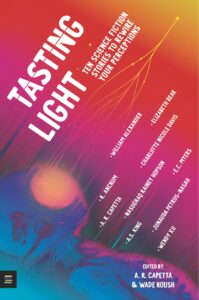A.R. Capetta’s top ten tips for writing speculative short stories
"Lean into your weirdness."
This post was written by A.R. Capetta, co-editor of Tasting Light: Ten Science Fiction Stories to Rewire Your Perception.
To celebrate the release of their sensational new YA sci-fi anthology, Tasting Light: Ten Science Fiction Stories to Rewire Your Perception, co-editor A.R. Capetta, shares their top ten tips for writing speculative short stories.
1. Write that first draft as quickly as you can get it down—without giving yourself time to judge it. If your story involves worldbuilding or even research, like many of the science and tech-inspired stories in Tasting Light, you can do that beforehand and layer in more afterward. But as you write a first draft try not to interrupt your brainwaves while they’re chasing the single, brilliant beam of light that is your idea.
2. Speaking of light! A great speculative short story is like a beam of light that’s gone through the facet of a prism. It is focused and transforming. As part of your writing process, read some of your favorite SFF stories. Look for the focus. Look for transformation—both in the story itself and in how it changes things for the reader.
3. Lean into your weirdness. Speculative stories are a perfect showcase for the weirdest parts of ourselves, so waste literally none of your time worrying about whether you’re being “too weird”—maybe the unique idea or perspective or writing style is exactly what makes this story great.
4. Be true to the voice of the story. This generally means thinking less about vague concepts of “good writing” and more about using words that are connected to your characters and world and themes.
5. Write about things you’re passionate about. Write in genres you love. Don’t save your best ideas for later!
View this post on Instagram
6. But do keep a small notebook or a file or a spot on your phone to save all the ideas that pop up when you don’t expect them. When you visit that list, look for ideas—maybe a character and a plot point, or a scientific concept and a setting—that could fit in the same story.
7. Consider your format. Many of the stories in Tasting Light have interesting formats—a graphic novel, a podcast script, a series of DNA-encoded letters sent back and forth across an icy moon. Sometimes unlocking a story isn’t just about what you want to say, but how you need to say it.
8. Once you have a draft of your story you love, set it aside. For a while. No, longer than that.
9. Then go back to it with fresh energy and an eye to building the strongest possible version of this story. Going back to the idea of light, revising short stories makes me think about building a fire. This is the part when you blow on that initial spark of the first draft and carefully arrange the logs, so it has the structure to keep burning. Start your revision by looking for what already shines! (And don’t overfocus on what you need to “fix” or what you don’t love—as you focus on building that blazing new draft, you’ll find that what you don’t need naturally falls away.)
10. Write. More. Stories. It might be tempting to keep revisiting or polishing endlessly. But unlike novels, which take a huge investment of time, you have the chance to refine your craft by writing as many stories as you can.
 Get your copy of Tasting Light: Ten Science Fiction Stories to Rewire Your Perception edited by A.R. Capetta and Wade Roush here.
Get your copy of Tasting Light: Ten Science Fiction Stories to Rewire Your Perception edited by A.R. Capetta and Wade Roush here.


